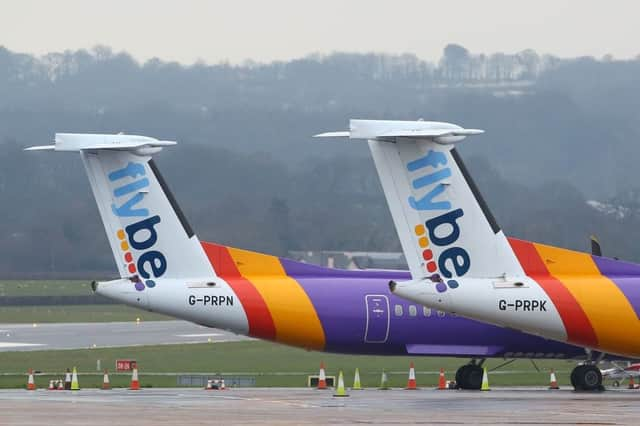Flybe has gone bust – will other airlines follow?


Following the collapse of Flybe on Thursday 5 March, more airlines could suffer losses as a result of the coronavirus, with experts predicting the industry could lose up to $113 bn (£87 billion).
As demand for air travel continues to drop, will other airlines face the same fate as Flybe? Here’s what you should know.
Why did Flybe go bust?
Advertisement
Hide AdAdvertisement
Hide AdOn Thursday 5 March, Flybe, an airline which had been in operation for the last four decades, announced that it was going into administration.
The company’s collapse leaves more than 2,300 staff members in a state of uncertainty, and has scuppered travel plans for many customers.
Flybe blamed its collapse in part on a drop in demand caused by the coronavirus outbreak, with many customers abandoning their travel plans as the virus continues to spread across the globe.
Chief Executive Mark Anderson said “Europe’s largest independent regional airline has been unable to overcome significant funding challenges to its business. This has been compounded by the outbreak of coronavirus which in the last few days has resulted in a significant impact on demand.”
Advertisement
Hide AdAdvertisement
Hide AdHowever, the company had been ailing for some time. It was bought over by a consortium involving Virgin Atlantic last year and over £100 million was invested but to no avail.
This comes after the UK’s oldest holiday provider Thomas Cook collapsed at the end of 2019, prompting the biggest peace-time re-patriation in British history. Flybe is the fourth UK airline to fail since 2017.
How has the coronavirus impacted air travel?
The coronavirus outbreak has seen airlines forced to cancel flights to and from badly-affected countries like Italy and China, while the surrounding panic has discouraged many others from travelling.
As a result, airline stock prices have fallen by almost 25% since the outbreak began, according to the International Air Transport Association (IATA).
Advertisement
Hide AdAdvertisement
Hide AdThis makes it around 21 points worse than the SARS virus outbreak in 2003. The IATA have suggested that this is partially because China’s economy is now so much bigger.
Unsurprisingly, the IATA have also found that the more cases of coronavirus a country has, the worse its air travel industry has been affected. In China, where there are now thousands of cases, bookings have fallen by over 70% compared to the previous year.
Will other airlines go bust as a result of coronavirus?
As travel is further restricted across the world, and demand for air travel falls, the airline industry is expected to face losses in the tens of billions.
The IATA has predicted that, in a worst case scenario where the virus continues to rapidly spread, as much as a fifth of the air sector’s revenue could be wiped out. This would mean losses of around £87 billion.
Advertisement
Hide AdAdvertisement
Hide AdIf the spread is more limited, the IATA have envisioned a scenario in which customer turnout is down by around 10% in most areas, rising to over 20% in countries like China and Italy.
However, a wider spread could see other countries across Europe and Asia rising to the higher end of that scale, leading to billions more in lost revenue.
Many airlines may find themselves unable to weather such a drought. It is highly possible that losses on this level will force more airlines out of business as the coronavirus outbreak continues.
IATA has suggested that those operating in Asia and Europe currently look like the most likely to struggle thanks to the severity of the outbreaks there, with the smaller airlines in those territories especially at risk.
Advertisement
Hide AdAdvertisement
Hide Ad“In little over two months, the industry's prospects in much of the world have taken a dramatic turn for the worse" they said, calling the situation “a crisis.”
This article originally appeared on our sister site, The Scotsman.